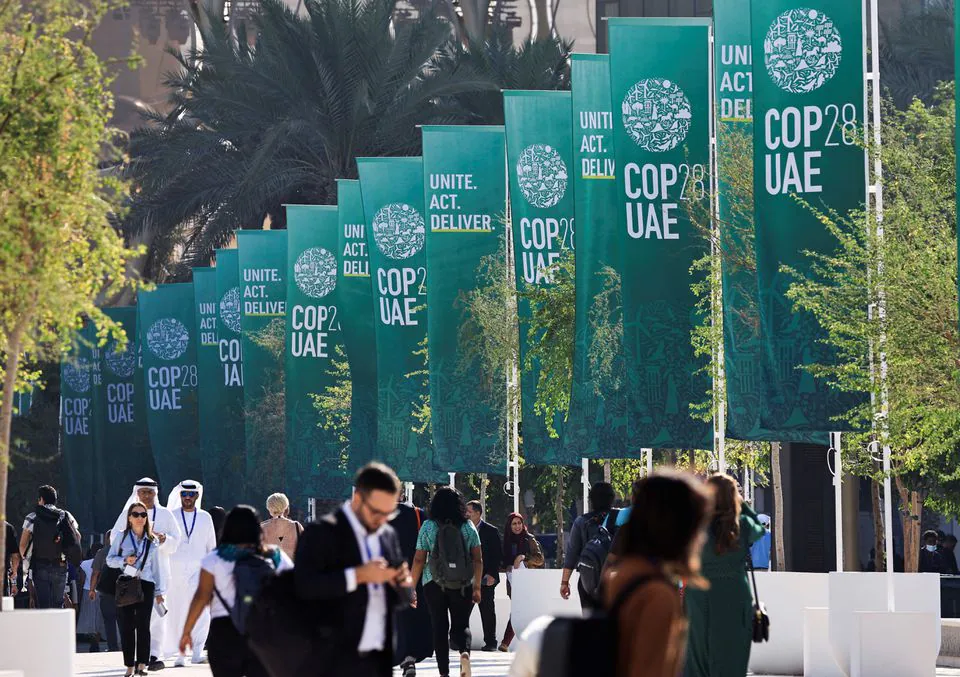
Countries clashed on Saturday over a possible agreement to phase-out fossil fuels at the COP28 summit in Dubai, jeopardising attempts to deliver a first-ever commitment to eventually end the use of oil and gas in 30 years of global warming talks.
Saudi Arabia and Russia were among several countries insisting that the conference in Dubai focus only on reducing climate pollution – and not on targeting the fossil fuels causing it, according to observers in the negotiations.
On the other side, at least 80 countries including the United States, the European Union and many poor, climate-vulnerable nations are demanding that a COP28 deal call clearly for an eventual end to fossil fuel use. COP28 President Sultan al-Jaber told nations late on Saturday to speed up their work to find a final deal, saying there were “still more areas of divergence than agreement”.
“The window is closing to close the gaps,” he told the summit.
OPEC Secretary General Haitham Al Ghais earlier said in comments read out to the summit delegates by an official: “We need realistic approaches to tackle emissions. One that enables economic growth, helps eradicate poverty and increases resilience at the same time.”
Earlier this week, the oil producer group sent a letter urging its members and allies to reject any mention of fossil fuels in the final summit deal, warning that “undue and disproportionate pressure against fossil fuels may reach a tipping point”. It was the first time OPEC’s Secretariat has intervened in the UN climate talks with such a letter, according to Alden Meyer of the E3G climate change think tank. “It indicates a whiff of panic,” he said.
EU climate commissioner Wopke Hoekstra criticised the letter as “out of whack” with climate efforts.
“By many, including by me, that has been seen as out of whack, as unhelpful, as not in tune with where the world stands in terms of the very dramatic situation of our climate,” he said.
Saudi Arabia is the top producer in OPEC and the de facto leader of the organizstion and Russia is a member of the so-called OPEC+ group. By insisting on focusing on emissions rather than fossil fuels, the two countries appeared to be leaning on the promise of expensive carbon capture technology, which the UN climate science panel says cannot take the place of reducing fossil fuel use worldwide.
Other countries including India and China have not explicitly endorsed a fossil fuel phase-out at COP28, but have backed a popular call for boosting renewable energy. China’s top climate envoy, Xie Zhenhue, described this year’s climate summit as the hardest in his career.
“I have participated in these climate negotiations for 16 years,” he told journalists. “The hardest meeting is this year’s. There are so many issues to settle.”
He said there was little chance the summit would be called a success if nations could not agree to language on the future of fossil fuels.
India’s environment minister, Bhupender Yadav, demanded “equity and justice” in any deal, holding that rich countries should be leading global climate action. Broader diplomatic grievances were also aired at the podium on Saturday, clouding the focus on global warming.
A Russia representative said in a speech that Moscow was looking into whether some of the roughly $300 billion in gold reserves frozen by the West after Russia invaded Ukraine could be used for a climate damage fund for developing countries.
Meanwhile, China complained about what it said was unacceptable talk about Taiwan’s participation in the talks. And a Palestinian representative denounced Israel’s war in Gaza, saying the conflict made it difficult to focus on climate change efforts.
With the summit’s scheduled to end on Tuesday, government ministers from the nearly 200 countries at the Dubai summit have joined in trying to resolve the fossil fuel impasse. Climate-vulnerable countries said a rejection of a fossil fuel mention at COP28 would threaten the entire world.
“Nothing puts the prosperity and future of all people on earth, including all of the citizens of OPEC countries, at greater risk than fossil fuels,” said Marshall Islands climate envoy Tina Stege in a statement.
The Marshall Islands, which faces inundation from climate-driven sea level rise, currently chairs the High Ambition Coalition group of nations pushing for stronger emissions-cutting targets and policies. To meet the global goal of holding climate warming to within 1.5 degrees Celsius above preindustrial temperatures, the coalition “is pushing for a phase out of fossil fuels, which are at the root of this crisis,” she said. “1.5 is not negotiable, and that means an end to fossil fuels.”
The latest version of the negotiating text, released on Friday, shows countries were still considering a range of options – from agreeing to a “phase out of fossil fuels in line with best available science”, to phasing out “unabated fossil fuels” to including no mention at all.
Germany’s climate envoy Jennifer Morgan said counties were “moving into the critical stage of negotiations”.
“It is time for all countries to remember what is at stake,” she said. “I am concerned that not all are constructively engaging.”
Asked about the OPEC letter, COP28 Director General Majid Al Suwaidi avoided the term “fossil fuels” but said the United Arab Emirates as president of the summit, wanted a deal to get the world on track to limit warming to 1.5 Celsius.
“Our COP president … clearly wants to see an outcome that is as ambitious as possible, and we believe we are going to deliver it,” he told a news conference.
Speaking on behalf of the Alliance of Small Island States, Samoa’s environment minister, Cedric Schuster, worried that this year’s talks were getting bogged down by disputes.
“We are extremely concerned about the pace of negotiations given the limited time we have left here in Dubai,” he told the summit from the main stage on Saturday.
“A target for renewables cannot be a substitute for a stronger commitment to fossil fuel phase-out and an end to fossil fuel subsidies,” he said. “COP28 needs to deliver both.”
Azerbaijan looks set to host next year’s COP29 climate change summit after winning backing from other Eastern European nations, unblocking a geopolitical deadlock over the next global gathering to address climate change.
For daily comprehensive coverage on COP28 in your inbox, sign up for the Reuters Sustainable Switch newsletter here.
- A Reuters report











